No Accidents with God!
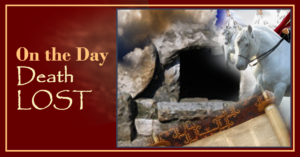
Now on the first day of the week, very early in the morning, they, and certain other women with them, came to the tomb bringing the spices which they had prepared. But they found the stone rolled away… (Luke 24:1-2)
O death, where is your sting? O Hades, where is your victory? (1 Cor 15:55)
While many Christians are aware of the Feast of Passover and its link to our Lord’s sacrificial death as “the Lamb of God” (John 1:29), the other six feasts get less airtime. But just as Messiah’s death at Passover has profound significance, His resurrection on the Feast of Firstfruits, during the Feast of Unleavened Bread, speaks volumes.
Which perfectly illustrates why I’m so fascinated with this subject of the Hebrew calendar. It shows there are no accidents with God!
And the Lord spoke to Moses, saying, “Speak to the children of Israel, and say to them: ‘When you come into the land which I give to you, and reap its harvest, then you shall bring a sheaf of the firstfruits of your harvest to the priest. He shall wave the sheaf before the Lord, to be accepted on your behalf; on the day after the Sabbath the priest shall wave it.” (Lev 23:9-11)
Quick quiz question: Can you think of any other event that happened on the first day of the new week following Passover?
Now on the first day of the week, very early in the morning, they… came to the tomb… (Luke 24:1)
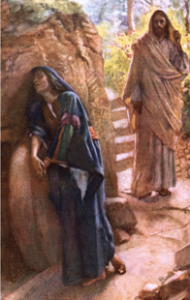
Harold Copping, Mary Magdalene at the Sepulchre
Exactly! Not only was Yeshua’s crucifixion coupled with the Lord’s Feast of Passover, His resurrection occurred on the Lord’s Feast of Firstfruits.
On the Feast of Firstfruits, the first-begotten of the Father (Heb 1:6)
and the Firstborn of Creation (Col 1:15-16)
became the Firstfruits of those who
will be resurrected (1 Cor 15:20-23).
Here’s how the spring feasts are generally held to be laid out. The Passover meal kicks off the seven-day Feast of Unleavened Bread. Which means a weekly Shabbat will fall sometime during the feast. The Feast of First Fruits takes place on the day that follows that Shabbat, the “first day of the week.” So Yeshua’s resurrection on the first day of the week fulfilled both the Feast of Firstfruits and Unleavened Bread.
Firstfruits: An Ancient Type of the Resurrection
The significance of the Feast of Firstfruits to the children of Israel is clear enough. The Feast of Firstfruits was a special presentation of the “first of the firstfruits” (Ex 34:26) to God. And it took place while all Jewish males were assembled in Jerusalem for the pilgrim feast of Unleavened Bread.
Here’s what would happen:
The priest was to wave the sheaf before [the Lord], i.e., to present it symbolically to [the Lord] by the ceremony of waving, without burning any of it upon the altar. The rabbinical rule… to dry a portion… and then… to burn them on the altar, was an ordinance of the later scribes.
– Keil and Delitzsch Biblical Commentary on the Old Testament
This wave offering of the first fruits was another picture of Messiah! Our Lord’s offering was pure and undefiled. Nothing needed to be consumed on the altar before He could ascend to the Father.
… A male lamb was then sacrificed as a burnt offering to the Lord along with a minchah (unleavened bread mixed with oil) and wine (Lev 23:13). Only after the wave offering was performed could the crop begin to be used (Lev 23:14).
It is altogether remarkable that on this day a defect-free male lamb was to be offered along with bread and wine–the very symbols Yeshua used to recall his sacrifice…
– John J. Parsons, Hebrew4Christians.com
The “first first fruits” presented at this Feast were a foretaste of a succession of first fruits celebrations that continued throughout the summer. Seven weeks later, the first fruits of the wheat harvest were presented in a wave offering (in this case, of baked loaves) at the fourth Feast of the Lord, Shavuot / Pentecost. And throughout the growing season, farmers from the villages would stream into Jerusalem, bringing their first fruits of grain and fruit (fresh or dried), and even wool from their sheep, to the Temple as per Deut 18:4.
The mitzvah of bikkurim (first fruits) began when a farmer in Israel (and some of the surrounding areas) would go out to his field and find budding fruit, and tie a reed around them, verbally declaring them “first fruits.”… Wealthy people would use trays of gold and silver, and simple folk would use baskets of grass and reeds…. Villagers of each region would gather [periodically] in a central town…. An ox with horns coated in gold would lead the procession, a crown of olive branches on its head…. A flute was played before the procession until it approached Jerusalem…. All of the artisans in Jerusalem would stand and greet them: “Our brethren, the inhabitants of so-and-so, you have come in peace.”
…acknowledging the connection between God and the bounty of the land and His blessing on the entire economy.
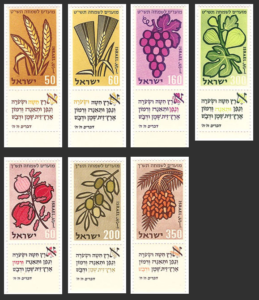 The seven species of ancient Israel.
The seven species of ancient Israel.
Barley, wheat, grapes, figs,
pomegranates, olives, dates–all
would be presented as “first fruits.”
(Stamps from 1958)
Like the “first of the firstfruits,” our Lord’s resurrection is a foretaste of a much greater harvest that will come in.
But now Christ is risen from the dead, and has become the firstfruits of those who have fallen asleep…. But each in his own order: Christ the first fruits, after that those who are Christ’s at His coming. (1 Cor 15:20-23)
…that He might be the firstborn of many brethren… (Rom 8:29)
Beloved, now we are children of God; and it has not yet been revealed what we shall be, but we know that when He is revealed, we shall be like Him, for we shall see Him as He is. (1 John 3:2)
Unleavened Bread: A Timeless Call to a Sinless Life
Paul saw great spiritual significance in Christ’s resurrection, not only on the Feast of Firstfruits, but also during the Feast of Unleavened bread.
Do you not know that a little leaven leavens the whole lump? Therefore purge out the old leaven, that you may be a new lump, since you truly are unleavened. For indeed Christ, our Passover, was sacrificed for us.Therefore let us keep the feast, not with old leaven, nor with the leaven of malice and wickedness, but with the unleavened bread of sincerity and truth. (1 Cor 5:6-9)
But what is the meaning of this seven-day restriction to unleavened bread? The question is one of the traditional “four questions” posed by the youngest boy present at the traditional Seder meal:
Why is it that on all other nights we eat chametz [leaven] or matzah, but on this night we only eat matzah?
Here is the traditional answer, and it’s a good one:
Slavery: Matzah was the bread of slaves and poor, it was cheap to produce and easy to make.
Freedom: Matzah also commemorates the fact that the bread did not have enough time to rise when the Jews hastily left Egypt.
But there’s more backstory—and it’s rich!
There is a connection between leaven (i.e. chametz) and Egypt. Apparently the Egyptians perfected the use of fermentation (i.e. yeast) for making bread, and such bread was even used as a form of currency…. Leaven therefore represents the “rich man’s bread”–that is, the bread eaten by the taskmasters who exploited others. Leavened bread is the food of this evil world of which we are to be purged….
Leaven (i.e., yeast) produces fermentation, which is a natural process of decay. The sages identify leaven with the… evil impulse that gives “rise” to lusts of the flesh and the pride of life. Yeshua was completely without sin, entirely unleavened, that is, free from the curse of death and its corruption. He was not “puffed up” by sin but was “a lamb without spot or blemish” given for our Passover sacrifice (1 Peter 1:19). Moreover, after He was buried, Yeshua did not suffer the natural process of corruption (i.e., decomposition of the body)…. Yeshua’s death “reversed the curse” by killing the power of sin and death through the sacrifice of himself (Hebrews 9:26).
– John J. Parsons, Worthy Is the Lamb: A Messianic Passover Haggadah
This sheds additional light on what Yeshua meant when He told His disciples to “beware the leaven of the Pharisees and Sadducees” (Matt 16:6). They were “puffed up” by insidious spiritual pride and covetousness (“devour widows’ houses,” Matt 23:14) which left them full of spiritual decay (Matt 23:27).
The seven-day Feast of Unleavened Bread represents radical separation from the world’s system. Our call to be God’s “own possession… a kingdom of priests and a holy nation” (Ex 19:5-6, 1 Pet 2:9), in the world but not of it (John 17:14-16).
The form of the traditional matzah bread itself is symbolic.
Traditional handmade matzah bread. The dough must be pierced to keep it from puffing up. Photo: Yoninah, Wikipedia
Look at the matzah and see that it is striped: “By his stripes we are healed”; pierced: “They shall look upon me whom they’ve pierced,” and pure, without any leaven, as His body was without any sin. And the Passover custom of burying, hiding and then resurrecting the second of three pieces of matzot (the middle piece), presents the Gospel.
– John J. Parsons, Hebrew4Christians.com
Modern matzah pierced by machine
Photo credit: Yoninah
Broad Application
Adherence to the commandment to bring their first fruits into the temple is often presented in the Hebrew Scriptures as a key indicator of Israel’s spiritual temperature.
Honor the Lord with your possessions,
And with the firstfruits of all your increase…. (Prov 3:9)As soon as [Hezekiah’s] commandment was circulated, the children of Israel brought in abundance the firstfruits of grain and wine, oil and honey, and of all the produce of the field; and they brought in abundantly the tithe of everything. (2 Chron 31:5)
And we made ordinances to bring the firstfruits of our ground and the firstfruits of all fruit of all trees, year by year, to the house of the Lord… to bring the firstfruits of our dough, our offerings, the fruit from all kinds of trees, the new wine and oil, to the priests, to the storerooms of the house of our God…. (Neh 10:35-37)
“For on My holy mountain, on the mountain height of Israel,” says the Lord God, “there all the house of Israel, all of them in the land, shall serve Me; there I will accept them, and there I will require your offerings and the firstfruits of your sacrifices, together with all your holy things. I will accept you as a sweet aroma when I bring you out from the peoples and gather you out of the countries where you have been scattered; and I will be hallowed in you before the Gentiles.” (Ezek 20:40-41)
As is often the case with the “shadows” and “copies” (Col 2:17) we see in the Law, the concept of firstfruits receives a broader spiritual application in the New Testament.
For where your treasure is, there your heart will be also. (Matt 6:21)
But seek first the kingdom of God and His righteousness, and all these things shall be added to you. (Matt 6:33)
As believers, we have received the “firstfruits of the Spirit” (Rom 8:23), who is “the guarantee of our inheritance” (Eph 1:14).
Did you know you are also “firstfruits”?
Of His own will He brought us forth by the word of truth, that we might be a kind of firstfruits of His creatures. (James 1:18)
But each one in his own order: Christ the firstfruits, afterward those who are Christ’s at His coming. Then comes the end, when He delivers the kingdom to God the Father, when He puts an end to all rule and all authority and power. (1 Cor 15:23-24)
We who have chosen to accept Yeshua’s reign in our lives are the “firstfruits” of the entire creation–which will accept His reign, willingly or not, on the day when every knee bows and every tongue confesses that Jesus Christ is Lord (Phil 2:10-11).
But the first of all these first fruits is Yeshua (1 Cor 15:23), raised on the Feast of Firstfruits. Again, no accidents with God!
So if you’re tracking our progress through the Lord’s seven feasts–His “appointed times,” מוֹעֲדִים, moadim–the first three spring feasts come in a tight cluster. We’ve pretty much completed them now. The three fall feasts do as well. (If you’re not familiar with the seven Feasts of the Lord, here’s a handy guide.)
The way the Lord ordained the Feasts in two clusters also conveys a message, because:
- The spring feasts are pictures of Messiah’s first coming as the Suffering Servant, the Lamb of God, while
- The fall feasts foreshadow His second coming as the Lion of Judah, the Great High Priest and King.
- The gap between the clusters is a picture of the period we’re in now, the “Age of the Gentiles,” when our Heavenly Bridegroom has “gone to prepare a place” (John 14:2-3) for us. When His bride yearns for Him and anticipates His soon return.
The signs that this age is nearing its end are all around us! Why do I say that? See this post for my personal “Top Four list“– The Son of Man is coming! Soon and very soon, beloved!
Now Is the “Acceptable Time,” the “Day of Salvation”
At the acceptable time I listened to you,
And on the day of salvation I helped you.
Behold, now is “the acceptable time,” behold, now is “the day of salvation”… (2 Cor 6:2)
Here’s something really cool! The passage Paul quotes here is Isaiah 49:8. Guess what the word for salvation in this passage is in the Hebrew? יְשׁוּעָה yešû‘āh: It’s a form of our Lord’s name! “…salvation, deliverance, help, victory, prosperity. The primary meaning is to rescue from distress or danger….” Isaiah told Israel to look for the “day of Yeshua”!
But He was wounded for our transgressions,
He was bruised for our iniquities;
The chastisement for our peace was upon Him,
And by His stripes we are healed.
All we like sheep have gone astray;
We have turned, every one, to his own way;
And the Lord has laid on Him the iniquity of us all….By His knowledge My righteous Servant shall justify many,
For He shall bear their iniquities. (Isaiah 53:5-6,11)
Today, people are looking for the Lamb. We’ve worked hard to spread the Good News that God is love—and He is! But many people picture Jesus only as the Suffering Servant, the gentle and meek Lamb who preached “judge not.”
I shudder to imagine their dismay when He returns as the Lion—jealous for His righteousness (1 Cor 11:2)—instead.
“And the Lord, whom you seek, will suddenly come to His temple; and the messenger of the covenant, in whom you delight, behold, He is coming,” says the Lord of hosts. “But who can endure the day of His coming? And who can stand when He appears? For He is like a refiner’s fire…” (Mal 3:1-2)
How astonished will this generation be when our Lord returns as the “refiner’s fire,” the Great High Priest, the Warrior King, and the Righteous Judge?
Brothers and sisters, come to Yeshua for salvation NOW. While you can still be brought in as a “firstfruit offering.” He stands at the door and knocks! (Rev 3:20)
Would you rather have the Lamb or the Lion as your Judge?
If you’ve never opened God’s free gift of salvation through Jesus (Rom 3:23, 6:23), please please please be persuaded to do it now! It’s simple. Just tell God from your heart that you admit you’re a sinner that needs a Savior (“For all have sinned and fall short of the glory of God.” Rom 3:23) that you’re done running your own life, and that you’re ready to make Jesus Lord of your life.
If you confess with your mouth Jesus as Lord, and believe in your heart that God has raised Him from the dead, you shall be saved. For with the heart a person believes, resulting in righteousness, and with the mouth he confesses, resulting in salvation. For the Scripture says, “Whoever believes in Him will not be disappointed.” (Rom 10:9-11)
The decision that saves you is that simple!
Simple… But no one said living it out will be easy. Especially now.

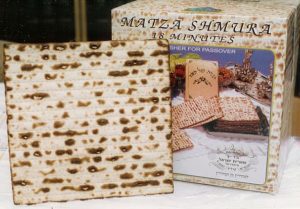

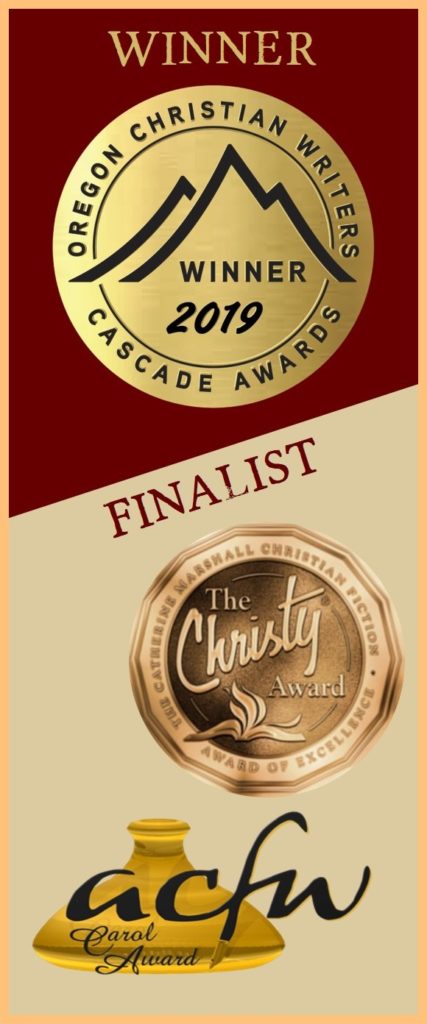
Another great and enlightening piece! May it reach many!
Thank you so much, Rose! I always appreciate your encouragement so much!!